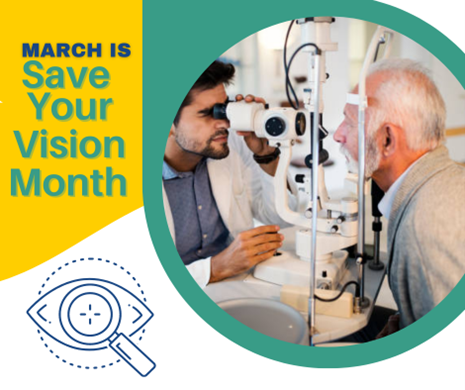Home » Blog » March Is Save Your Vision Month
March Is Save Your Vision Month
Posted by: Clayton Eye Center in General, March 28, 2023

This month and year-round, we would like to remind you to prioritize your eye health in 2023 by scheduling your comprehensive eye exam and considering the importance of good eye health. Save Your Vision Month traces its founding to 1927 by American Optometric Association (AOA) members. This month and every month, we proclaim and deliver essential eye care that goes beyond vision correction and places our patients’ preventive eye health regimen to the highest standards.
Here is a list of healthy eye tips to celebrate Save Your Vision Month year-round. Please keep these tips as a reminder for yourself, and share them with your loved ones.
Have A Colorful Plate
Eating a balanced diet of colorful fruits and veggies, eggs, and fish is incredibly beneficial in maintaining your health. Essential nutrients in leafy greens, berries, beets, citrus, and even certain fish high in Omega 3s are vital for healthy vision.
Stay Hydrated
Remember that dehydration reduces the lubrication of your eye, making eye strain and dry eye even more uncomfortable. Keep your water bottle filled and keep it with you throughout the day. You’re more likely to stay steadily hydrated if your water bottle is with you throughout the day. Your eyes will be sure to thank you!
Have Fun and Stay Active
Exercising 3-4 times a week significantly benefits your eyes and overall health. Exercising reduces your blood pressure and your eye pressure, which is beneficial for lowering your Glaucoma risk. Crank up your favorite tunes and dance in your living room or enjoy a walk around the neighborhood and enjoy nature.
Renovate Your Makeup Bag
Add your eye makeup to your routine calendar to remind yourself to replace expired eye makeup products. Mascara and liquid eyeliners should be replaced every three months, and eye shadows and pencil liners no more than one year. Also, please use extreme caution when using eyelash extensions because of the glue ingredients that could harm your vision.
Protect Yourself From The Warm Sun Rays
Don’t forget to wear your hats, sunglasses, and protective goggles when necessary. As the days get longer and the sun shines brightly, don’t forget to protect your eyes with 100% UV-blocking glasses. Like sunscreen protects your skin, the glasses protect your eyes from damaging light sun rays.
Take A Digital Break
More people today of all ages spend many hours each day looking at a tablet, computer, or phone. Save your vision and adopt the 20/20/20 rule. Limit your digital eye strain by taking a break from your screen every 20 minutes, focusing on something at least 20 feet away for 20 seconds.
Crush the Habit
Smoking has been linked to a significantly increased risk for Glaucoma, Cataracts, AMD, and Diabetic Retinopathy. Smokers are also twice as likely to develop Uveitis, an inflammation of the uvea that can lead to vision loss. Furthermore, smoke exacerbates dry-eye conditions. The good news is that people who quit smoking almost reduce their risk compared to people who have never smoked.
Schedule Your Eye Exam
Don’t delay or deny yourself from scheduling your eye exam TODAY! Eye exams can detect serious health concerns. For example, diabetic retinopathy is diagnosed with a dilated eye exam. Glaucoma is a silent, sneaky disease that can often go unnoticed until irreparable vision loss.
National Save Your Vision Month is an initiative started by the AOA that has helped spread awareness about taking care of your eyes. You can take part in this initiative simply by scheduling your own eye exam and encouraging others to do the same.
Celebrate Save Your Vision Month Everyday Of The Year And Make Your Eye Health A Priority!

References: American Academy of Ophthalmology, American Optometric Association, and Centers for Disease Control and Prevention (CDC). This blog provides information and discussion about eye health and related subjects. The content provided in this blog and any linked materials are not intended and should not be considered medical advice. If the reader or any other person has a medical concern, they should consult with an appropriately licensed physician.
